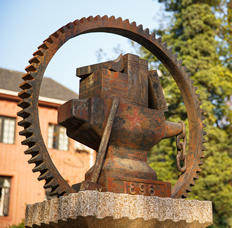Innovation and Culture: MBA Students on Study Tour to Israel
Publisher : MBA Office May.20,2016
With the innovative financial and technology center Tel Aviv, and the proclaimed holy city of Jerusalem, Israel harbors great diversity in a relatively small territory. What is the secret behind its economic success, especially the world-renowned high-tech industry and the flourishing startup culture? What prompted companies like Google, Facebook, Intel, Microsoft and IBM to set up R&D facilities there? With these questions in mind, a group of 27 MBA students and alumni from Antai College of Economics and Management embarked on a 9-day study tour in this middle-eastern country led by program director Professor Hu Haiou and staff members.
An Innovative Country
For the first stop of the tour, students visited Beit Hatfutsot - The Museum of the Jewish People - on the campus of Tel Aviv University, which was established in 1955 and was ranked among the world's top 100 by Times Higher Education magazine. The university also invited a Rabbi to introduce the traditional Havruta way of studying in which a pair of students analyze, discuss, and debate a shared text. Almost everyone the group had met in Israel spoke highly and proudly of Havruta, saying that it improves their abilities to think and communicate, and makes them better at changing perspectives and finding creative solutions when faced with difficulties, turning the impossible into reality.
The study tour showcases different aspects of Israel’s innovative culture through a variety of talks, company visits and face-to-face communications with local business community.
Leonardo Leiderman, Professor of Comparative Economics at the Eitan Berglas School of Economics, Tel Aviv University and Chief Economic Advisor of Bank Hapoalim, the country’s biggest commercial bank, gave a lecture on the future prospects of the world economy and the emerging markets, while Professor Yesha Sivan, Executive Director of the Coller Institute of Venture at Tel Aviv University, taught students how to think and identify the six platforms of digital entrepreneurship, and asked them to present their own creative projects and hold road shows in teams.
Moti, a 39-year-old Israeli entrepreneur who has successfully founded three companies in ten years shared his personal story, and Saul Singer, co-author of Start-up Nation: The Story of Israel's Economic Miracle, a best-seller which investigates Israel's innovative prowess, also gave his view on entrepreneurship.
The group then visited Ashkelon Desalination Plant, a 28-acre complex capable of converting 15,000 to 16,000 cubic meters of seawater every hour, built by a joint venture of IDE Technologies, A world leader in water treatment solutions; Stratasys, global leader in 3D printing, and Netafim, global leader in smart drip and Micro irrigation solutions.
These Israeli companies, though not particularly large in size, are all among the world’s best in their relative fields, and provide products and solutions that are closely linked to the nation’s condition.
The Strength Within
The tour also revealed the rich history and culture of this sacred land. Students witnessed weeping pilgrims in Bethlehem, the birthplace of Jesus and the place where David was crowned as the king of Israel, stood in front of the holy Western Wall in the old city of Jerusalem, and learned the unyielding spirit of the Israeli people on top of the ancient fortification Masada.
Israel has the second-largest number of startup companies in the world after the United States, and the largest number of NASDAQ-listed companies outside North America. The country’s achievements in cutting-edge technologies, software, communications and life sciences have evoked comparisons with the Silicon Valley.
The vibrant scene of innovation in Tel Aviv and the cultural, spiritual and religious richness in Jerusalem let students rethink profoundly on their home country and themselves. The Chinese and the Israelis are both ancient peoples with a lot in common, and the two countries can surely achieve more in innovation and mutual collaboration.


